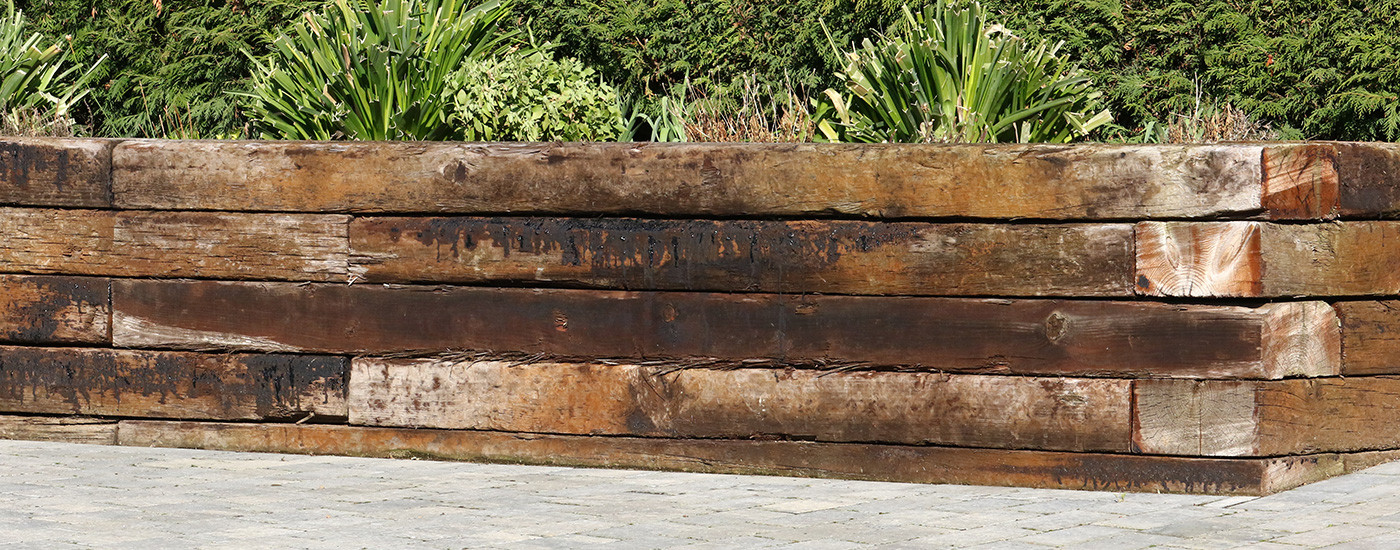Why wooden railway sleepers?
Wood has been the main material used in the railway industry since it first began and is still the most widely used material for railway tracks around the world. The reason for this is because wood provides good load-bearing properties and reduces noise and vibrations. Where railway companies have tried other materials under metal tracks, none have proved to be as flexible as wood.
Railway sleepers for the garden
Today, sleepers are not used in the garden for the properties they bring to the railway industry but more for their aesthetic, and also their cost effectiveness. Sleepers add an unmistakable rustic charm to any setting, whether contemporary or traditional, and when properly maintained will last for years.
Types of wooden railway sleeper
It is possible to buy genuine, used and reclaimed railway sleepers from auctions and salvage yards. However, beware of using them in a domestic setting around children and pets as they are likely to have been treated with creosote, a harmful preservative. New wooden garden sleepers are available from reputable timber merchants and are supplied in softwood and hardwood.
The difference between softwood and hardwood garden sleepers
Softwood and hardwood garden sleepers come from different trees. Softwood sleepers are sawn from coniferous trees with exposed, bare seeds, such as pine, cedar and fir, while hardwood sleepers come from deciduous tree. Deciduous trees lose their leaves in winter and have flesh-covered seeds (cherries) or hard cased seeds (acorns). Popular hardwoods are oak and beech. Softwood garden sleepers can be purchased treated or untreated. Untreated sleepers should be treated with a suitable preservative before use.
Hardwood sleepers have a higher density than softwood sleepers and are therefore much heavier and longer lasting. Their durability when in contact with the ground makes them suitable for permanent structures such as retaining walls. By comparison, softwood sleepers are lighter in weight; they are easier to handle and manoeuvre and can be sawn and drilled without too much difficulty.
Using railway sleepers in the garden
Your use of railway sleepers in the garden is limited only by your imagination and there are lots of ways to use garden sleepers. They make good garden edging as they are robust, and they are strong enough for use in retaining walls or for raised beds and planters. Sleepers can also be used to create walkways and paths in the garden as well as steps and terraces.
Garden railway sleepers from Witham Timber
At Witham Timber, we supply quality hardwood oak sleepers and pressure treated softwood sleepers. Our oak sleepers measure 100mmX200mmX2400mm (4”X8”X8’) and weigh in at around 42kg. Offering all the characteristics you expect from oak, these are perfect for creating striking landscaping features.
Our softwood sleepers are available in softwood brown and softwood green and are pressure treated for rot resistance and to prevent fungal decay. They are available in three different sizes and are perfect for creating raised beds and planters.
If you have any questions about any of our wooden garden sleepers, please send us an email to sales@withamtimber.co.uk or call our friendly sales team on 01205 359188 during office hours.

